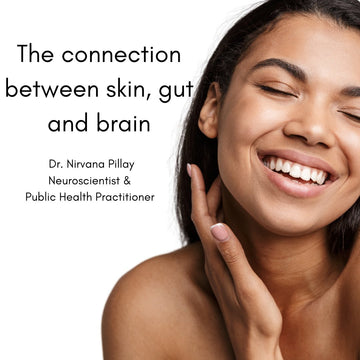The connection between the gut, skin, and brain is a complex and fascinating one. It's a connection that has been the focus of much research in recent years, and the findings have been intriguing. Scientists have found that the gut, skin, and brain are interconnected in ways that we previously never imagined. In this blog, we will explore the relationship between the gut, skin, and brain and how taking care of one can have a positive impact on the others.
The Gut-Skin Connection
The skin is the largest organ in the body, and it plays a vital role in protecting us from the outside world. However, the health of our skin is not just about what's happening on the surface. The skin's health is also affected by what's happening inside our bodies, specifically our gut.
The gut is home to trillions of bacteria, both good and bad. These bacteria play a crucial role in our overall health, including the health of our skin. When the balance of good and bad bacteria in the gut is disrupted, it can lead to a variety of skin problems, including acne, eczema, and psoriasis.
Research has shown that a healthy gut microbiome can help to prevent and treat skin conditions. A study published in the Journal of Clinical and Aesthetic Dermatology found that taking probiotics can improve the skin's barrier function, leading to a reduction in acne and rosacea.
In addition, research has also found that certain foods can help to improve the health of the gut and, in turn, the health of the skin. Foods that are rich in probiotics, such as yogurt, kefir, and sauerkraut, can help to balance the gut microbiome and improve the health of the skin.
The Gut-Brain Connection
The connection between the gut and the brain is known as the gut-brain axis. It's a two-way communication system that allows the gut and the brain to communicate with each other. The gut-brain axis plays a crucial role in regulating many of the body's functions, including digestion, immunity, and mood.
Research has found that the gut microbiome can have a significant impact on mental health. When the balance of good and bad bacteria in the gut is disrupted, it can lead to a variety of mental health problems, including anxiety, depression, and even autism.
A study published in the journal Psychopharmacology found that taking probiotics can improve mood and reduce symptoms of anxiety and depression. In addition, research has also found that certain foods can help to improve the health of the gut and, in turn, improve mental health. Foods that are rich in prebiotics, such as bananas, garlic, and onions, can help to feed the good bacteria in the gut and improve mental health.
The Skin-Brain Connection
The skin is not just an organ that protects us from external factors; it's also an organ that communicates with the brain. The skin-brain connection is a two-way communication system that allows the skin and the brain to communicate with each other.
Research has found that the skin can have a significant impact on mental health. When the skin is damaged or inflamed, it can lead to a variety of mental health problems, including anxiety and depression.
In addition, research has also found that certain skincare rituals can have a positive impact on mental health. Massages, for example, have been shown to reduce stress and anxiety levels, leading to improved mental health. Skincare products that contain ingredients such as lavender and chamomile can also have a calming effect on the skin, leading to improved mental health.
How to Improve the Gut-Skin-Brain Connection
Now that we understand the connection between the gut, skin, and brain, how can we improve it? Here are some tips to help improve the gut-skin-brain connection:
Eat a healthy, balanced diet: Eating a diet that is rich in whole foods, such as fruits, vegetables, whole grains, and lean protein, can help to improve the health of the gut and skin. These foods are also rich in nutrients that are important for brain health, such as omega-3 fatty acids and B vitamins.
Take probiotics: Probiotics are live bacteria that are good for the gut microbiome. They can help to improve the balance of good and bad bacteria in the gut, leading to improved skin and mental health. Probiotics can be found in foods such as yogurt, kefir, and sauerkraut, as well as in supplement form.
Reduce stress: Stress can have a negative impact on the gut, skin, and brain. To reduce stress, try practicing relaxation techniques such as deep breathing, meditation, or yoga. Exercise is also a great way to reduce stress and improve overall health.
Use gentle skincare products: Harsh skincare products can damage the skin's natural barrier, leading to inflammation and other skin problems. Use gentle, non-irritating skincare products that are free from harsh chemicals and fragrances.
Get enough sleep: Sleep is crucial for overall health, including the health of the gut, skin, and brain. Aim to get 7-8 hours of sleep per night. If you have trouble sleeping, try establishing a bedtime routine, such as reading or taking a warm bath before bed.
Stay hydrated: Drinking enough water is important for maintaining the health of the gut, skin, and brain. Aim to drink at least 8 glasses of water per day.
Practice good hygiene: Keeping the skin clean and free from bacteria is important for preventing skin problems. Wash your face twice daily with a gentle cleanser, and avoid touching your face throughout the day.
In conclusion, the gut, skin, and brain are interconnected in complex ways. By taking care of one, we can improve the health of the others. Eating a healthy diet, taking probiotics, reducing stress, using gentle skincare products, getting enough sleep, staying hydrated, and practicing good hygiene are all important for improving the gut-skin-brain connection. By incorporating these tips into your daily routine, you can help to improve your overall health and wellbeing.





